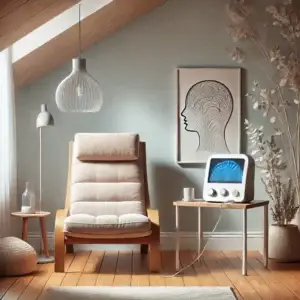How to Calm the Nervous System by Simply Closing Your Eyes
Feeling like life’s got you on fast-forward? Stress piling up like dirty laundry? It’s time to hit “pause” — and guess what? You don’t need fancy gadgets or a 12-step routine to do it. All you need are your eyelids. Yep, those little flaps of skin can work wonders to help you calm the nervous system.
Did you know that up to 80% of the sensory input bombarding your nervous system comes through your eyes? Research supports this, as studies have shown that closing your eyes can significantly reduce sensory input and promote relaxation (source). By simply closing them, you’re giving your brain a well-deserved break.
In this article, you’ll discover the science behind this surprisingly simple technique, why it works, and how you can make it a go-to stress-busting tool. Plus, we’ll throw in a few fun tips and tricks to keep you chill. Let’s blink our way to bliss, shall we?
The Modern Dilemma: Overstimulation of the Nervous System
What Causes Nervous System Overstimulation?
Welcome to modern life — a 24/7 circus of buzzing phones, blaring sirens, and endless to-do lists. No wonder your nervous system feels like it’s had one too many espressos. Here’s what’s cranking up the chaos:
Common Causes of Overstimulation:
Digital Overload: Notifications dinging every 30 seconds, anyone?
Noise Pollution: From honking horns to your neighbor’s “music taste” at 2 a.m.
Workplace Stress: Juggling deadlines and endless Zoom calls — fun times.
Lack of Mental Breaks: Ever feel like you’re “on” 24/7? Yeah, that.
Research from the Journal of Behavioral Medicine shows that chronic stress can seriously mess with your health, increasing anxiety and cardiovascular risks. But don’t sweat it (literally) — there’s an easy way to hit the “off” switch on that stress.
Symptoms of an Overstimulated Nervous System
Feeling frazzled? Check for these signs:
Physical Symptoms: Racing heart, tense muscles, and shallow breathing.
Mental Symptoms: Can’t focus? Racing thoughts? Welcome to the club.
Emotional Symptoms: Snapping at your loved ones for no reason? Yep, that’s a sign too.
If any of these sound familiar, you’re in good company. But don’t worry — relief is only a blink away.

The Hidden Cost of Ignoring Nervous System Overstimulation
Why It’s Important to Address Nervous System Overload
Ignoring overstimulation is like ignoring a “check engine” light on your car — eventually, something’s gonna break. Here’s why you’ll want to give your nervous system some TLC:
Consequences of Chronic Overstimulation:
Physical Health Issues: Think high blood pressure, heart problems, and a weak immune system.
Mental Health Decline: Anxiety, burnout, and “I’m done with everything” vibes.
Productivity Drain: Ever sit at your desk for an hour but get nothing done? Same.
Real-World Example: Meet Sarah, a 34-year-old multitasking master. Between work deadlines, family obligations, and her phone’s endless “ping” notifications, she’s officially fried. After weeks of irritability and exhaustion, she finally learned to “just close her eyes” — and boom, mental clarity restored. You’re next.
Every day you put off calming your nervous system, stress gains more power over your mind and body. But don’t worry — you’re just one blink away from feeling better.

How to Calm the Nervous System Instantly: Just Close Your Eyes
The Power of Closing Your Eyes
If closing your eyes feels too simple to work, think again. This isn’t just “nap energy” — it’s neuroscience in action. When you shut your eyes, you’re reducing sensory overload and giving your brain a chance to chill.
How Does It Work?
Sensory Deprivation: 80% of your sensory input comes from your eyes. Close ‘em, and it’s like flipping the “do not disturb” sign for your brain. [Placeholder for study citation]
Brainwave Shift: When you close your eyes, your brain ups its alpha wave game, the same kind of chill vibes you get from meditation.
Vagus Nerve Activation: This “super-nerve” kicks in, telling your body, “Hey, relax, we’re safe now.”
Research from the Journal of Behavioral Medicine highlights how short sensory deprivation sessions, such as closing the eyes can significantly reduce stress, anxiety, and mental fatigue, leading to improved mental clarity and relaxation. Read the full study here. Turns out, your eyelids are nature’s stress-busting curtains.
The Science Behind It
Brain scans don’t lie — closing your eyes shifts brain activity from the occipital lobe (vision processing) to areas tied to introspection, relaxation, and memory. Translation? Your brain stops “doing all the things” and starts “being all the calm.”
You’ve got the science, the why, and the how. Ready to make this trick part of your day? Up next, we’ll show you how to turn a simple eye-close into a daily superpower.

How to Use the “Eye-Closing” Method for Maximum Calm
Step 1: Find Your Jedi Zone
It’s hard to relax when your phone’s buzzing or your dog’s barking at the mailman. To get the most out of the “eye-closing” method, find a spot where you’re less likely to be interrupted. It doesn’t have to be a mountaintop or a luxury spa — your couch or a quiet office space will do just fine.
Pro Tips:
Put your phone on “Do Not Disturb” (for real this time).
Grab noise-canceling headphones if you’re in a noisy environment.
Let others know you’re taking a 5-minute “brain break.”
Why It Matters: Creating a dedicated “jedi zone” minimizes distractions, making it easier for your nervous system to relax. When your brain knows you’re in a safe space, it’s much quicker to activate the “rest-and-digest” mode.

Step 2: Breathe Like You Mean It
Your eyes may be closed, but your breath is where the magic happens. Pairing eye-closing with intentional breathing sends a powerful signal to your brain that it’s time to relax. This technique is called “triangle breathing” and it’s a game-changer for calming your nervous system.
How to Do Triangle Breathing:
Inhale for 4 seconds through your nose. This gentle inhale stimulates the sympathetic nervous system, preparing your body for balance.
Hold for 7 seconds. This pause pushes oxygen from your lungs to the cells in your body, nourishing every part of you.
Exhale for 8 seconds through your mouth. This slow, deliberate exhale activates the parasympathetic nervous system — the part responsible for that sweet, sweet calm. Making the exhale twice as long as the inhale tells your body it’s safe, promoting full-body relaxation.
Repeat this 3-5 times, and feel your stress melt away with each breath. This simple yet powerful breathing method is like a mini reset button for your entire nervous system.
Step 3: Visualize Your Happy Place
With your eyes closed and your breath in sync, now’s the time to engage your imagination. Visualization is like a mental vacation, and it’s a powerful way to calm the nervous system.
How to Do It:
Picture a place that makes you feel safe and happy (think beach, forest, or grandma’s kitchen — you do you).
Engage all your senses: hear the waves, smell the cookies, feel the breeze.
Stay here for a few minutes, just soaking up the calm vibes.
Why It Works: Your brain reacts to visualization as if it’s real. By “tricking” it into thinking you’re on that sunny beach, you’re encouraging the release of feel-good chemicals like dopamine and serotonin.
Scientific research confirms that reducing visual sensory input through eye-closing activates the parasympathetic nervous system, leading to a calm, restful state (source). It’s like a mini mental vacation — and we all need one of those.

The Long-Term Benefits of Calming Your Nervous System
Here’s What Happens When You Regularly Close Your Eyes
Closing your eyes isn’t just a quick fix — it’s a long-term investment in your mental and physical well-being. Here’s what you can expect when you make this practice part of your daily routine.
1. Lower Cortisol Levels High cortisol (the “stress hormone”) can wreak havoc on your health. Studies show that reducing sensory input through eye-closing can lower cortisol levels and support the body’s shift into “rest-and-digest” mode (source). Regularly closing your eyes and engaging in calming practices can make you feel more balanced and less reactive to stress.
2. Better Sleep Quality Having trouble sleeping? Closing your eyes while practicing triangle breathing before bed can help you drift off faster and stay asleep longer. Your body associates this routine with relaxation, which leads to deeper, more restorative sleep.
3. Improved Focus and Mental Clarity Think of closing your eyes as hitting the “refresh” button for your brain. When you remove visual distractions and stimulate your parasympathetic nervous system, your brain gets a mental reset, leading to sharper focus and better decision-making.
4. Emotional Resilience By calming your nervous system, you’re training your mind to respond to stress with grace instead of panic. Over time, you’ll notice that life’s curveballs feel a little less overwhelming.

How to Turn Eye-Closing Into a Daily Habit
Make It a Ritual, Not a One-Time Trick
Sure, closing your eyes works wonders in a pinch, but why not make it part of your daily self-care routine? Here’s how to weave it into your schedule:
Morning Mindfulness: Before you grab your phone, take 2 minutes to close your eyes, breathe, and visualize your ideal day.
Lunch Break Reset: Feeling that mid-day slump? Close your eyes for 5 minutes to recharge.
Pre-Sleep Wind-Down: Use triangle breathing while lying in bed to prepare your body and mind for sleep.
Pro Tip: Set a reminder on your phone to practice eye-closing at the same time every day. Consistency turns small habits into lasting change.
Sometimes, the simplest solutions are the most powerful. By closing your eyes, practicing intentional breathing, and using visualization techniques, you can take back control of your nervous system and feel more balanced, calm, and clear-headed. The best part? You can do it anywhere, anytime. So go ahead — close your eyes and see the difference for yourself.
Additional Resources:
Learn more about calming the nervous system with neurofeedback on Clear Mind Utah’s What is IASIS MCN?
Discover why Clear Mind Utah was recognized as the Best Neurofeedback Provider in Utah
Explore how Clear Mind Utah sets a new standard for neurofeedback therapy and client care in this US Insider feature






